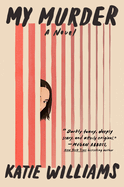
For Louise, the weird thing isn't so much that she was murdered and then brought back to life--cloned, along with several other female murder victims. What perplexes her is that, due to an effect of the replication process, she can't remember her murder or the days leading up to it. There lie the sci-fi and mystery elements of My Murder, Katie Williams's of-its-own-ilk fantasy-thriller hybrid, which is further distinguished by its whittled-to-perfection prose.
The novel's beginning and middle find narrator Louise, three months into her cloning, reacclimating to life as a married mother, resuming her job as a touch therapist and trying to recall her murder. To ease their readjustment, the victims of Edward Early's killing spree--"He was leaving women all over mid-Michigan, crumpled on benches, on roads, on playground toys, like a trail of silvered candy wrappers"--attend a serial killer survivors' group. ("The name was a lie," notes Louise. "None of us had survived.") About two-thirds of the way into My Murder, there's a shudder-making plot twist and a ratcheting up of Williams's withering critique of the obsession with true crime, and the favoritism shown to certain victims of violence; as someone says to Louise about her selection by the replication commission, "you were a case they could make--a pretty, young, white woman.... You weren't out at night.... You were blameless." How Williams (Tell the Machine Goodnight) manages to lace her narrative with biting social commentary without diluting the novel's black comedy is another mystery entirely. --Nell Beram, author and freelance writer

